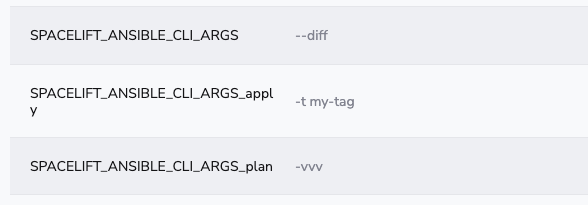Reference»
Stack Settings»
- Playbook - A playbook file to run on a stack.
- Skip Plan - Runs on Spacelift stacks typically have a planning and an applying phase. In Ansible for the planning phase we are running Ansible in check mode. However, not all Ansible modules support check mode and it can result in a run failure. You could configure your playbook to ignore certain errors (e.g. using
ignore_errors: "{{ ansible_check_mode }}") or choose to skip the planning phase entirely (e.g. in situations when handling check failures at the playbook level is not an option). On Ansible stacks, this phase can be skipped without execution by setting theSPACELIFT_SKIP_PLANNINGenvironment variable to true in the stack's environment variables.
Other settings»
For most of the settings below, there is usually more than one way to configure it (usually either through environment variables or through ansible.cfg file). More on Ansible configuration can be found in official Ansible docs.
SSH private key location»
If you want to use SSH to connect to your hosts you will need to provide a path to the SSH private key. You can do that using the ANSIBLE_PRIVATE_KEY_FILE environment variable.
Forcing color mode for Ansible»
By default, Ansible will color the output. You can disable colored output using the ANSIBLE_FORCE_COLOR environment variable.
Debugging Ansible runs»
When running into issues with Ansible playbooks a good way to debug the runs is to increase the Ansible verbosity level using the ANSIBLE_VERBOSITY environment variable.
Controlling SSH ControlPath parameter»
Ansible uses ControlMaster and ControlPath SSH options to speed up playbook execution. On some occasions, you might want to modify default values to make them compatible with your execution environment. Depending on your exact setup, you might want to adjust some of the SSH settings Ansible uses.
The default value for ANSIBLE_SSH_CONTROL_PATH_DIR is /tmp/.ansible/cp.
Specifying additional CLI flags»
You can specify additional CLI flags using the following environment variables:
SPACELIFT_ANSIBLE_CLI_ARGS- will take effect for both planning and applying phasesSPACELIFT_ANSIBLE_CLI_ARGS_plan- will take effect only for the planning phaseSPACELIFT_ANSIBLE_CLI_ARGS_apply- will take effect only for the applying phase
If both phase specific and generic flags are used, both will take effect.

Overriding default requirements.yml file location»
As specified in Ansible Galaxy section, we search for requirements.yml in a couple of default locations. If you wish to use requirements.yml file from a custom location, you can overwrite the location by setting SPACELIFT_ANSIBLE_REQUIREMENTS_FILE to a filepath of your requirements.yml file.
File permissions»
There are a few nuances with certain files' permissions when using Ansible.
ansible.cfg»
If you use ansible.cfg file within a repository (or - more generally - within the current working directory) make sure that permissions on that file (and parent directory) are set properly. You can find more details in official Ansible documentation in the section on avoiding security risks with ansible.cfg
SSH private key files»
If you are using SSH to connect to your hosts, then you need to make sure that private keys delivered to the worker have the correct permissions.
As the ssh main page states:
These files contain sensitive data and should be readable by the user but not accessible by others (read/write/execute).
sshwill simply ignore a private key file if it is accessible by others.
Typically, you would like to deliver private keys directly at the worker level where you can fully manage your environment. If that is not an option, you can always use our read-only mounted files or any other option you find suitable.